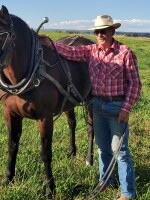Industrial hemp production in the U.S, dropped dramatically since the boom in 2019. About 107,000 outdoor acres were licensed this year, according to data provided by Hemp Benchmarks. That's down from 580,000 licensed acres in 2019, when hemp was grown for the extraction of CBD oil on most of those acres. However, a lot of the hemp grown over the past two years is stored in bags, waiting to be sold when prices are more favorable.
But maybe there's a rainbow on the horizon that will help to bring higher prices for certain hemp products. The U.S. Department of Energy recently announced that it had was awarded a fellowship through its partnership with the Oakridge National Laboratory to the, Idaho-based company, Hempitecture, that specializes in sustainable building materials. One of the Promising products is insulation made form hemp fibers. Hemp bats have an R-value of 3.7 per inch compared to fiberglass bats that range form an R value of 2.9 to 3.7. R-Value is the rating system used to grade insulation products or a material's insulating properties.
Prices for some agricultural fertilizers are at the highest level in the past decade and more, which may lead to lower crop production and higher food bills. For example, prices for urea, a common nitrogen-based fertilizer, shot up to the highest level since 2012.
The price of DAP, a phosphate fertilizer, is matching the high prices of 2008. Potash or potassium, which is necessary for vigorous plant growth, is also on the rise. As the price of these fertilizers climb, farmers have to weigh the cost of applying the optimal rate of fertilizers versus the returns they can expect to receive when they sell their crops.
Alfalfa is a popular crop in the western U.S. according to the U.S. Department of Agriculture. Alfalfa is grown on about 6.8 million acres of cropland in 11 Western states, with its production in these states amounting to $8.5 billion in 2018, and over 4 million tons is exported annually to other countries.
Pueblo Community College Southwest is offering a robust agricultural program at its campus in Mancos. The agricultural education classes are designed to meet the needs of high school students through concurrent enrollment as well as adults who want to work toward an associates degree or earn certificates in a variety of agricultural workforce disciplines that will support their current farming or ranching businesses or prepare them to start a new business. Many of the degree pathways will allow students to transfer credits to four-year agriculture programs such as those offered by Colorado State University. The PCC Agriculture Program has already launched their first semester with Animal Science and Agriculture Business classes.
Academic and local business partners are supporting the new program with scholarships geared only for agriculture students, while other businesses are providing internships and help with employment. Information about the program is available from the Ag Program Coordinator at 970-564-6230 or at pueblocc.edu/programs/agr.
Greek Stoic philosopher Epictetus wrote: "Only the educated are free."



